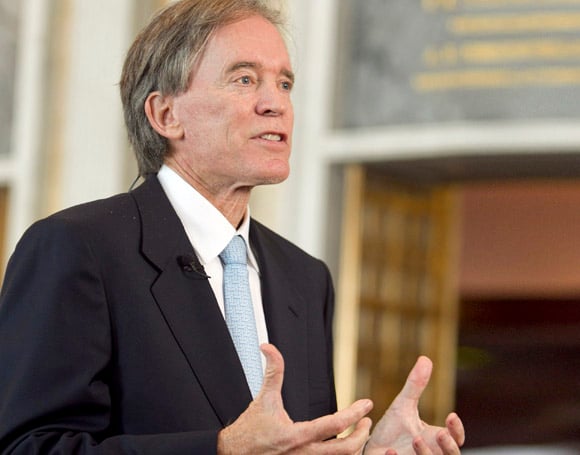Pacific Investment Management Co.'s Bill Gross said that while he anticipates the end of the bull market in bonds, it's not the beginning of a significant bear market as economic growth and government stimulus measures fail to translate into broader employment gains.
Pacific Investment Management Co.’s Bill Gross said that while he anticipates the end of the bull market in bonds, it’s not the beginning of a significant bear market as economic growth and government stimulus measures fail to translate into broader employment gains.
Employers in the U.S. added fewer jobs in December than forecast and the jobless rate dropped to 9.4 percent, partly reflecting a shrinking workforce, a sign the labor-market recovery will take time to develop. Payrolls increased 103,000, compared with the median forecast of 150,000 in a Bloomberg News survey, Labor Department figures showed today. Treasury yields will drift up “gradually, but not significantly,” Gross said.
“Things are getting better, and they are getting better because of the prior stimulus and the expected stimulus going forward,” Gross said in a radio interview on “Bloomberg Surveillance” with Tom Keene. “But that doesn’t necessarily speak to jobs.”
Gross said Oct. 27 that a renewal of bond purchases by the Federal Reserve would likely signify the end of a 30-year bull market in bonds. The central bank announced Nov. 3 it would acquire up to $600 billion in Treasuries through June to spur employment and avert deflation, after earlier buying $1.7 trillion in assets to pull the economy out of its crisis.
Pressure Tempered
Pressure for higher yields will still be tempered by the Fed’s bond purchases and by its holding the benchmark interest rate near zero, Gross said today. Policy makers have kept the federal funds rate at a range of zero to 0.25 percent since December 2008 to fuel economic growth.
The central bank bought $7.2 billion today of Treasuries due from July 2013 to November 2014. It has purchased U.S. debt every day this week.
“The Fed is holding down the front and the back end,” Gross said. “We don’t see the Fed moving in 2011, so that will hold in the front and to some extent affects positively the 10- year in terms of lower yields.”
The economy is likely to grow 3 percent to 3.5 percent in the fourth quarter from the same period of 2010, Pimco Chief Executive Officer Mohamed El-Erian said Dec. 9. That compares with Newport Beach, California-based Pimco’s previous estimate for 2 percent to 2.5 percent growth.
That growth alone won’t be enough to spur corporations to hire workers without government help, and Congress and President Barack Obama’s administration have been unwilling to embark on new spending programs, Gross said.
‘Investment-Oriented’
“What we have had so far is a consumption-led revival, and once the immediate thrust of fiscal policy and stimulation wears off we are left with a consumption-oriented economy,” he said. “What we need is an investment-oriented economy, and the administration and Congress have failed in that regard.”
Investors should buy debt in emerging-market countries with higher real interest rates, wider credit spreads and strong balance sheets, he said. That will offer more return as well as protection from dollar depreciation as U.S policy makers run up record deficits at the expense of economic growth, wrote Gross, the manager of the world’s biggest bond fund, in his monthly investment outlook released Jan. 5.
The yield on the 10-year Treasury note dropped nine basis points, or 0.09 percentage point, to 3.31 percent today after the payrolls report, according to BGCantor Market Data. Earlier it increased five basis points. The two-year note yield fell seven basis points to 0.59 percent.
Pimco has championed the idea of the “new normal,” in which investors will receive returns lower than the historical average as global growth slows and the influence of the U.S. is diminished.
The $250 billion Total Return Fund managed by Gross posted a 7.85 percent gain in the past year, beating 73 percent of its peers, according to data compiled by Bloomberg. The one-month performance is a loss of 1.01 percent, beating 20 percent of competitors. Pimco is a unit of Munich-based insurer Allianz SE.
--Bloomberg







